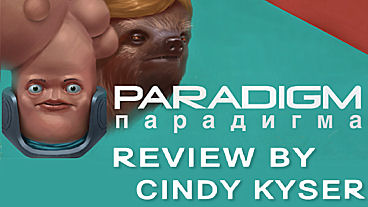
Paradigm Review
Kudos to Jacob Janerka for a delightfully entertaining adventure! The humor and creativity of Paradigm are unique and should not be missed.







Genre: 2D Point-and-Click Adventure
Release date: April 5, 2017
Imagine a world where your offspring are not the result of chance DNA combinations. After all, why would you want to leave your earthly belongings to an heir who lacks intelligence, talent, and charm? If you are a person with means, DUPA Genetics has a deal for you! Design your own Prodigy Child and live happily ever after. Unless, of course, something goes wrong…
Paradigm is a delightful (albeit somewhat twisted) adventure featuring a mutant of the same name. He is the result of a genetic error – a failure of the Prodigy Child Program. To deny the evidence of their fallibility, DUPA has banished him to an abandoned Soviet town in the fictional country of Krusz. He is living out his days in solitude and is prone to self-talk and thinking out loud. Paradigm exists somewhere in the post-apocalyptic future in a world marred by nuclear waste and the detritus of former occupants.
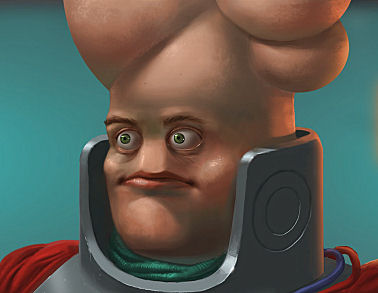
The game begins as Paradigm entertains himself in an abandoned nuclear reactor with “technical issues.” He has a sharp wit, a quick mind, and a love of “Phat Beasties” music. He speaks with an Eastern European accent that greatly enhances his overall charm. The room is filled with active click-points – some are inventory items to be gathered but most trigger sidebar comments from Paradigm. No topic is out-of-bounds and he pokes fun at the gaming industry, religion, corporations, and all things technical. He is a master at tongue-in-cheek humor with the funniest lines delivered with a straight face.
His first task is to update the operating system for the reactor before a melt-down occurs. The disk is missing and the quest to find it leads Paradigm out into the nuclear wasteland to interact with a bizarre cast of characters. Each encounter leads to another… to get the disk, he must deliver drugs to a junkie… to get the drugs, he must bypass a home security system… to enter the house, he needs to steal from a junkyard owner obsessed with traffic cones… etc.
Once a nuclear accident has been averted, Paradigm’s adventure expands to include the DUPA headquarters in a quest to track and eliminate his nemesis – an evil sloth. His path to the final confrontation involves recovering body parts, visiting a space station, hoodwinking the Church of Glam, and unlocking the sloth’s inner sanctum. All-in-all, it is a crazy adventure that will keep you on your toes and entertained to the very end.
Paradigm uses a standard point-and-click interface. To move Paradigm to a new position on the screen, you click on the desired destination. To learn more about an object, you click on the object and he will walk over to examine it. Navigation between locations is made easy by a postcard of Kursz which allows you to “hop” to a new area by clicking on the map. At DUPA headquarters, you can navigate between floors of the building using the elevator or by using the map function on your Dupagen (a hand-held personal assistant).
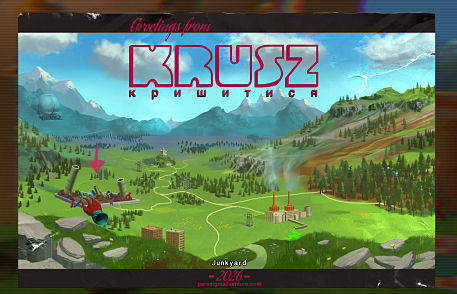
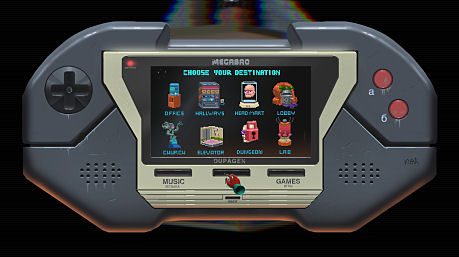
Inventory is collected and accessed using a menu drop-down at the top of the screen. Inventory and environment objects can be examined and/or used with a right-mouse click to display available actions and a left-mouse click to select. To use an inventory object in the environment, simply drag-and-drop.
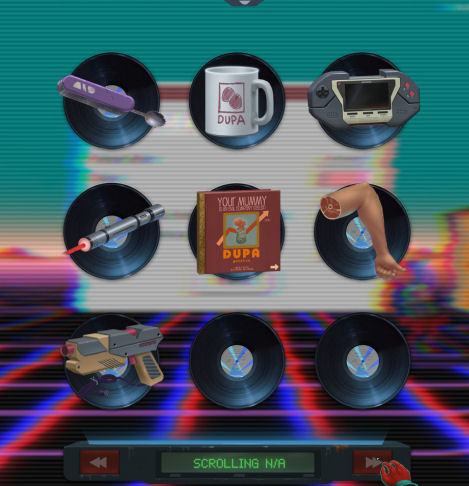
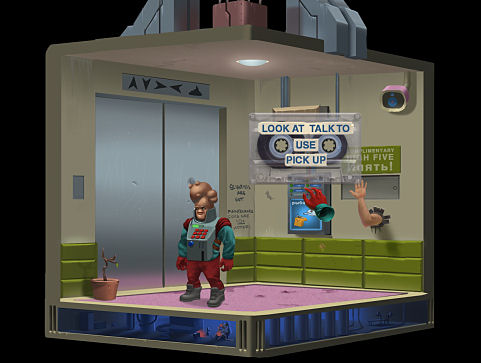
Paradigm has a lot of dialog that you will not want to miss. To initiate a conversation, you right-click on a character and select “talk to” as the action. A dialog tree appears and you can walk through various topics with the option of excusing yourself at any time. For those who would rather read than listen, dialog can be clicked through to expedite.
Finally, the game has an auto-save on exit but can also be explicitly saved to multiple slots. This is a wonderful thing, as you can quit at any time without any loss of progress and you can return to multiple points in your game if you are so inclined.
Although a tutorial is provided at the beginning, Paradigm is an intuitive game that is easy to start playing. Optional hints are available through the “Cutie Tumour Chats,” which educate and entertain. Most puzzles are inventory-based and make sense if one looks at the world through mutant eyes. Some mechanical repairs are required and some situations are solved by playing arcade mini-games with pixelated interfaces that feel authentic as you “level up.” If you are alert and curious, there are clues for every conundrum you encounter.
Within 30 seconds of starting Paradigm, I knew I would love this game. Initially, you choose your difficulty level from options that are uniquely described. Next, you watch a Dupa Genetics advertisement for the Prodigy Child Program which had me laughing before the game got going. After that, it just kept getting better.
Paradigm is a game that demands that you pay attention so as not to miss some of the fun. When Paradigm muses about the whereabouts of the person who is supposed to be manning the space station, you may catch a glimpse of a guy floating by the window after a spacewalk mishap. While inside a Dupagen server, you will encounter a Tech Support Rep who is as helpful in the game world as in real-life, suggesting that a computer reboot solves all. Towards the end, you will find the final gate locked with a demand for a fictional credit card to finish the game. As Paradigm scams for a card number so that he can complete his quest, fictitious pop-up ads begin appearing at the bottom of the screen. It’s all part of the game and kept me chuckling.
Kudos to Jacob Janerka for a delightfully entertaining adventure! The humor and creativity of Paradigm are unique and should not be missed.
|
+ Paradigm, the mutant, is one of the most likable game characters I’ve encountered in a long time
+ Graphics, soundtrack and gameplay combine to create a unique and highly enjoyable adventure
+ Matter-of-fact and irreverent humor will be loved by those who choose not to take life too seriously
No negatives
|
 |
System Requirements
Processor: 2 Ghz (Dual Core)
Memory: 2 GB RAM
Graphics: OpenGL 2.0 compatible with 512 MB RAM (Shared Memory is not recommended)
Storage: 5 GB available space
Processor: 2 GHz (Dual Core) Intel
Memory: 2 GB RAM
Graphics: 256 MB RAM

Leave a Reply